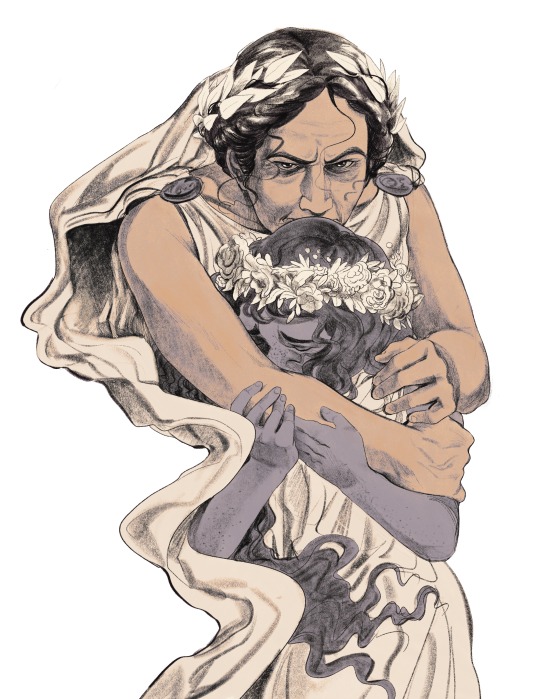Text
when the academic article is so good it has you giggling and kicking your feet
8K notes
·
View notes
Text
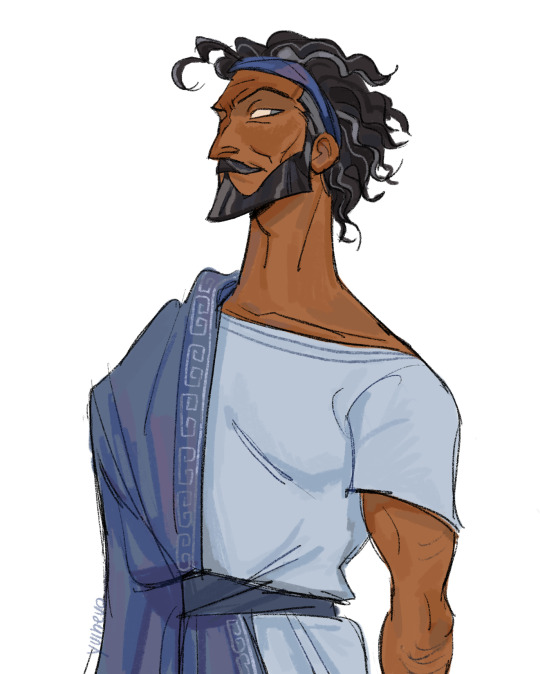
Another Odysseus, it’s been a while (yes this is my new favourite pose to draw)
3K notes
·
View notes
Text
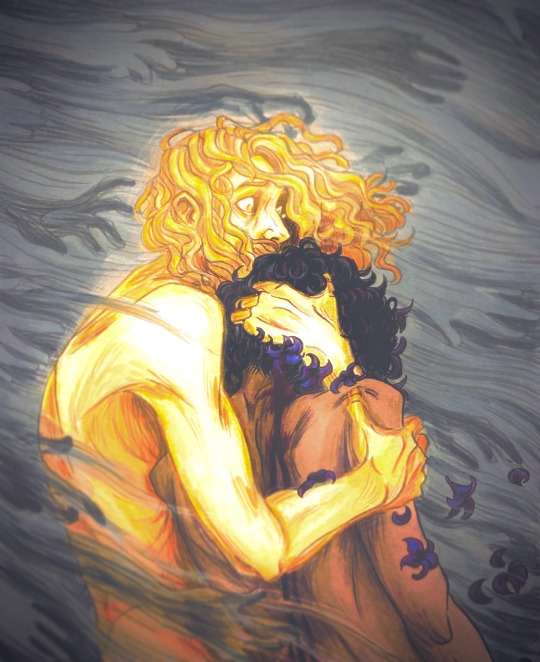
The Death of Hyacinthos.
2K notes
·
View notes
Text
love a reading of odysseus that understands war will still traumatize you when you're not morally opposed to it, when you're good at it, when you desire it, whether what you desire is violence or the glory and profit that come with it, and when you win it
367 notes
·
View notes
Photo
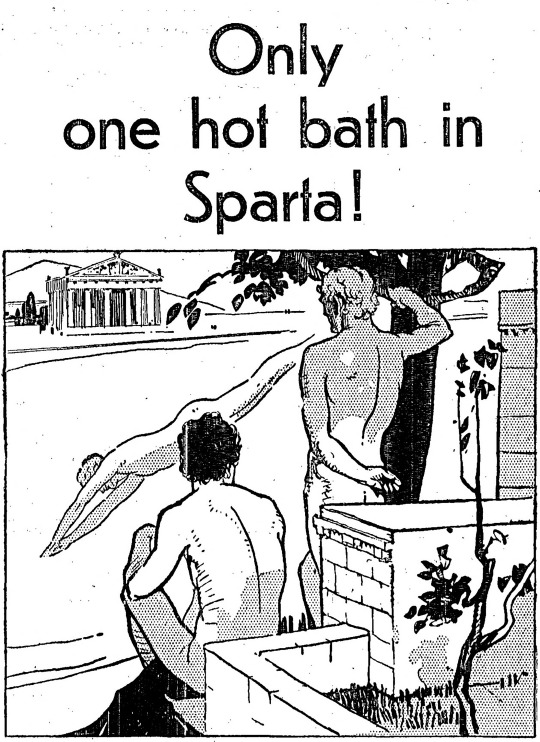
Source details and larger version.
Archival advertisements reveal the trends of their time: here’s my collection of vintage ads.
193 notes
·
View notes
Text
for a tragedy the iliad is pretty funny. compiled some of my favorite things about it (not in chronological order)
- patroclus barely speaks for most of the book but EVERYBODY loves him. like he’s literally the entire greek camp’s precious meow meow. the ORIGINAL sweet little meow meow. even the GODS are sad and feel bad when he dies. even HOMER loves patroclus, always calling him “faultless patroclus” “my patroclus” “gentle patroclus” “sweet patroclus” WE GET IT. achilles, briseis, menelaus, ajax, literally every member of the greek camp is down ATROCIOUS for patroclus all bc he’s just one Really Nice Dude. just one very Sweet and Polite Fella. one Extra Special Guy <3 his whole narrative purpose is simply to be everyone’s special little scrunkly
- in one of the MANY passages where achilles is lamenting about how sad it is that patroclus is dead he promises patroclus’ corpse that he will have many deep-bosomed trojan and dardanian women weep for him. he tells his dead buddy “i will get the absolute THICKEST hoes with the BIGGEST mommy milkers for your funeral” honestly? id be honored
- all the arguments escalate so quickly. an old man very politely appeals to agamemnon to pretty please give his daughter back and offers him a huge fortune for her and agamemnon calls him a crotchety old bitch and tells him he’ll fucking kill him if he ever sees him again
- that same old man is a priest of apollo. you know, the plague god? anyway priest calls in a favor and apollo curses the greeks with a plague
- to address this, achilles decides to resolve it by calling all the greeks together and passive aggressively going “HM! i WONDER what could have caused a PLAGUE! it’s almost like we OFFENDED the PLAGUE GOD somehow. now WHAT could WE (cough agamemnon) done to offend the PLAGUE GOD?????” all in front of agamemnon
- zeus spends most of the book desperately trying to keep the gods OUT of the war. then once he’s finally had enough he just calls them all together and says “go nuts” and then they do
- artemis talks shit on the battlefield so hera calls her a bitch, steals her bow, and beats her with it. artemis then goes back to zeus and cries
- polydamas says to hector “hey you killed patroclus and achilles is gonna be fucking pissed. we should probably go back to the city while we can” and hector calls him a bitch and tells him to stfu. achilles then chases them back to the city and hector decides to stay outside and get killed by achilles instead of going in with the rest of the army bc he didn’t wanna hear polydamas say “i told you so”
- diomedes is about to fight with a guy called glaucus but then they realize their ancestors were friends or something so they decide not to kill each other, and diomedes says “hey! why don’t we even trade armor! :) just as a show of friendship! :))” and glaucus is like “yeah sure!” and gives diomedes his really nice gold plated armor while glaucus gets diomedes’ shitty plain bronze armor
- achilles makes a bitchy comment to his horses about leaving patroclus to die and the horse momentarily gains the ability to talk just to tell achilles it wasn’t THEIR goddamn fault, tells achilles he’s gonna die soon, and then goes back to being a normal horse.
- zeus with his daughters: oh child ❤️ oh my dear ❤️ oh there there i didn’t really mean it ❤️ sweetie why don’t you go help the greeks?❤️
- zeus with his sons: “ares you fucking donkey”
- everyone calling paris a stupid coward bitch every time they see him. all of troy fucking hates him. hector fucking hates him. helen fucking hates him.
- paris getting dressed up in fancy armor and prancing to the front lines going “i’ll fight ANY of you greeks!” and menelaus (the guy whose wife he stole) goes “alright bet” and paris nearly pisses his pants and tries to hide but then his brother hector calls him a piece of shit and tells him he hopes he dies and makes him fight menelaus. menelaus promptly ROCKS HIS SHIT. literally starts dragging him by his helmet like a rag doll, would’ve killed him if aphrodite hadn’t teleported paris outta there (BOO)
3K notes
·
View notes
Text
wish the piraeus archaeological museum had a public catalog but hey everyone check out this c. 420-410 funerary stele from salamis with a tragic actor staring at his mask
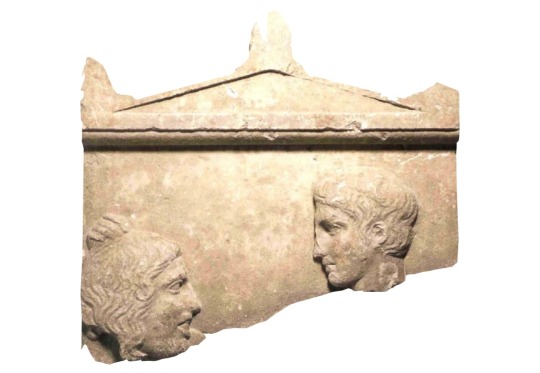
196 notes
·
View notes
Text
it's not so much that a cyclops is monstrous because a one-eyed giant who eats people must be a monster; it's that anyone who does not follow your laws, your customs, your culture must be a monster.
polyphemus eats his guests not because he's a cannibal — cannibalism also being a taboo that applies to humans, and he's not human — but because he doesn't follow xenia. polyphemus says to odysseus "we don't respect zeus here," but odysseus approaches polyphemus as if polyphemus is the foreigner. he expects his customs (which serve him, a conquering hero) to take precedence, even though he is the one away from home. he's been away from home for over ten years.
because to odysseus, there's not much difference between the trojans (the city he's sacked) or the cicones (a people he raided on the way home) and polyphemus, right? except that polyphemus is able to turn the tables. he is a monster, not in the sense that he is not a human being — the trojans have not been treated as human beings — but because he can insist that his law be respected in his own home.
and it's not that odysseus can't adapt. look at how differently he approaches nausicaa, or even circe. but his perspective is what we wayfind by, and all the while odysseus, at troy and during the wanderings, is himself foreign.
and then he comes to phaeacia and weeps over songs of war. and then he comes home and doesn't recognize it. and then divine intervention both hides him from and reveals him to his son and wife. and then he has to conquer his own homeland. and then the poem ends, abrupt and final journey spoken of but unresolved. and each of these things makes his perspective strange to himself, and by extension to us. it is exactly at the moment odysseus comes home that he believes himself to be lost, foreign, for good.
362 notes
·
View notes
Text
keep thinking now about the idea of the ancient greek stage building as a doorway into death, which is separated from the stage (the space of the living) by the screen of the skene. cassandra calls it as much ("the gates of hades") when she enters the house of atreus. by convention characters cannot die on stage but must exit, usually into the skene, to be killed. cassandra's just extra explicit about it because of her foresight, but every entry into the stage building is a step into death. and then some people come back out of it!!!
354 notes
·
View notes
Text
Something I think ppl who aren't used to it struggle with when it comes to ancient history is that frequently 'we do not and cannot know this' is the only truthful response a historian can give. People severely overestimate how much we actually know about Ancient Rome.
I remember talking to someone at a party once about the debate over Septimius Severus's ethnicity (whole other can of worms) and they asked if genetic testing of his remains was not a way to settle it and I was like oh. Oh okay you are under the impression we have the physical remains of Roman emperors from the second century AD alright then. (We. Do not.)
29K notes
·
View notes
Text
A Brief List of Resources for Classical Studies:
TOSC-IN:
A database enabling you to search for keywords in article titles from c.160 Classics related journals. Provides a link to an abstract or full text version if one exists online.
Classical and Medieval History:
Annotated list of Reference Websites
Diotima: Women and Gender in the Ancient World
Online database and resources for studying Women and Gender in the ancient world.
Encyclopedia of the Hellenic World:
“Original electronic project aiming at collecting, recording, documenting, presenting and promoting the historical data that testify to the presence of Hellenic culture throughout time and space.”
Perseus Digital Library:
A showcase of digital and print resources for Classical studies.
World Archaeology:
Books, Magazines, Blogs, Travel. All Archaeology related.
House of Ptolomy:
Portal website on the Ptolomatic (holla!) Empire.
Star Myths and Constellation Lore:
Information website about the above.
Virgil.com:
Basically a portal site and resource for information on all things Virgil.
Homerica:
Portal and Resource. Link is in French, but you can have the website translated to any language.
Exploring Ancient World Culture:
“On-line course supplement for students and teachers of the ancient and medieval worlds.”
Subject Centre for History, Classics, and Archaeology:
“The Subject Centre for History, Classics and Archaeology is part of the Higher Education Academy.”
The Iris Project:
“an educational charity introducing the languages and culture of the ancient world to UK state schools in order to enrich the curriculum.”
Roman Law Resources
“ information on Roman law sources and literature, the teaching of Roman law, and the persons who study Roman law.”
Egyptology Resources
“World Wide Web resource for Egyptological information.”
ABZU:
“guide to networked open access data relevant to the study and public presentation of the Ancient Near East and the Ancient Mediterranean world”.
Stoa:
A consortium for electronic publication in the Humanities, including most notably: Suda-On-Line English translation of the Suda, a 10th century Byzantine historical encyclopedia. Demos: Classical Athenian Democracy; a practical description of how the various institutions of Athenian democracy actually worked. Metis Bruce Hartzler’s collection of interactive QTVR panoramas for ancient Greek archaeological sites. And Medicina Antiqua A resource for the study of medicine in the Greek and Roman world.
Hellenic History:
From the Stone Age through the Modern Period from The Foundation of the Hellenic World (FHW), a non-profit cultural institution based in Athens, Greece.
Hellenic Culture:
Website of the Hellenic Ministry of Culture with sites on the museums, monuments, and archaeological sites of Greece.
Athenian Agora Excavations:
Website of the American School of Classical Studies at Althens’ excavations of the Athenian Agora.
Digital Classicist:
Concise information on projects applying computing technologies to Classical/Ancient Historical research.
VROMA:
Online scholarly community of teachers and students who share an interest in the ancient Roman world; images, texts, history and many other resources.
GNOMON Online:
Recent journal articles and book in the Classics. Type general search term under “Alle Felder” (All Fields) or specific “Autor” (Author) and hit “Suche Starten” (Start search).“
Ancient World Mapping Center:
University of North Carolina. Cartographic resources, including a collection of free digital maps for educational use.
Ancient Scripts:
A website by “enthusiasts” rather than scholars but very interesting!
The Beazley Archive Classical Art Research Center:
Databases and study tools.
Bryn Mawr Classical Review:
Timely open-access, peer-reviewed reviews of current scholarly work in the field of classical studies (including archaeology). This site is the authoritative archive of BMCR’s publication, from 1990 to the present.
Archive of Performances of Greek and Roman Drama
It investigates the performance of ancient texts in any medium and any period, from Greek tragedy to Roman epic, from stage to screen, from antiquity to the present day.
The British Library Digitized Manuscripts
Contains digitised versions of a quarter fo the British Museum’s Greek manuscripts.
The Ancient World Online:
A blog which, much like this, presents a variety of online resources for the Ancient world.
Electronic Archive of Greek and Latin Epigraphy:
A website which seeks to store virtual Greek and Latin epigraphy of the ancient world, through a federation of multiple archive banks.
Projekt Dyabola:
Litterature and Object databases.
The Digital Sculpture Project:
A website devoted to studying ways in which 3D digital technologies can be applied to the capture, representation and interpretation of sculpture from all periods and cultures. Up to now, 3D technologies have been used in fruitful ways to represent geometrically simple artifacts such as pottery or larger-scale structures such as buildings and entire cities. With some notable exceptions, sculpture has been neglected by digital humanists.
Animus:
The open access Canadian Journal of Philosophy and Humanities.
American Philological Association’s Society for Classical Studies:
A “ principal learned society in North America for the study of ancient Greek and Roman languages, literatures, and civilizations.”
The Classical Association of Canada:
Access to a wide variety of resources about Classics in Canada including graduate programs, and the monthly bulletin.
Corpus Thomisticum:
The works of St. Thomas Aquinas in Latin.
J. O’Donnell’s commentary on Augustine’s Confessions:
An on-line reprint of Augustine: Confessions, with commentary by James J. O'Donnell.
LANGUAGE RESOURCES:
UC Berkeley Ancient Greek Resources:
Pronunciation Guide; Accentuation Drills; Vocabulary Drills; and much more.
Akropolis World News:
The news of the world in Ancient Greek- a great way to learn and practice the language.
Logeion:
Quick look-up of Greek and Latin words across all of the Perseus lexica.
Dictionaries [VIA Perseus Project]: LATIN || GREEK
NUMISMATICS [COINAGE]:
American Numismatic Societ’s MANTIS:
Database on more than 600,000 objects.
CHRR Online:
Coin hoards of the Roman Republic Online archive.
Online Coins of the Roman Empire:
Similar to CHRR but coins of the Empire.
Roman Provincial Coinage Online:
A standard typology of the provincial coinage of the Roman Empire.
British Museum’s Roman Coinage:
A series of resources on Roman coinage.
Sylloge Nummorum Graecorum:
The Sylloge Nummorum Graecorum is a British AcademyResearch Project, the purpose of which is to publish illustrated catalogues of Greek coins in public and private collections in the British Isles.
MANUSCRIPTS:
Digitalized Greek Manuscripts:
Princeton’s Modern language translations of Byzantine sources, digitized Greek manuscripts.
Pinakes:
Pinakes s'ouvre à de nouvelles collaborations institutionnelles et accueille maintenant des projets de recherches sur les manuscrits de divers domaines. On trouvera l'ensemble des partenaires et des financements passés ou actuels sur la page Colophon.
Greek Codicology/Paleography:
A detailed biliography on Greek codicology.
Resource Lists by School: All links are to Classics, or Antiquities portals for more resource lists.
Oxford Libraries
Cambridge Libraries
University of Toronto
Berkeley Classics Department
Library of Congress: Classics and Medieval History
Virginia Tech: Electronic Antiquity
Brock University: Classics Research Guide
Cambridge Ancient History Series
Williams.
University of Texas
Princeton University
Text Databases [Via Oxford]:
Antiquity
American Journal of Archaeology
Archaeology Magazine
Arion
Cambridge Archaeological Journal
Classical Philology
Classical Quarterly
Classical Review
Eranos
Greece & Rome
Journal of Near Eastern Studies
Journal of Field Archaeology
Journal of Roman Military Equipment Studies
Journal of Roman Archaeology
Kernos
Phoenix
Pomoerium
Syllecta Classica
Zeitschrift fur Papyrologie und Epigraphie
Gateways:
Argos - search-engine for all major classical resources
Classics Section of the Intute gateway.
Voice of the Shuttle Classics Page from University of California, Santa Barbara
Classical and Biblical Literary Research Tools compiled by Jack Lynch at Penn
Reading Classics Gateway
Kirke Katalog der Internetressourcen für die Klassische Philologie
NOTE: So I compiled a list of some of my favorite classics sites to use. I also put in links to other school’s departments and libraries. Almost all Universities which have Classics departments have resources lists. If you want to add to the list, please do!
All of the schools above have much more extensive lists for you to use! I made this list in little over half an hour, so there is much room to be expanded on.
NEW ADDITIONS:
Latin Library at Packard Humanities Institute - http://latin.packhum.org/ (PHI numbers standard way to refer to Latin texts, look at the ones Perseus uses - it’s PHI).
Brepolis - http://www.brepolis.net/ - may need to access this via your institution or its ezproxy (includes the Library of Latin Texts A and B LLT-A and LLT-B and many other interesting resources).
L’Annee Philologique - http://www.annee-philologique.com - another one in which you’ll have to use via your institution’s ezproxy or other online database (we use ebscohost). Many journals you submit articles to expect references to other journals use the abbreviations in APh.
For databases of journals, first start at JSTOR - http://www.jstor.org - again, institutional access is required.
((Via: monumentum))
The Latin Library - A collection of Classical and Medieval texts in Latin, organized by author.
The Internet Ancient History Sourcebook - A collection of mostly primary source texts translated into English. Not comprehensive, but covers a broad range of topics.
((Via: hodie-scolastica))
9K notes
·
View notes
Text
actual modern historians: in this letter, Margaret tells her dearest friend Adela, “my love, I long to worship at your altar of Venus once more. come to me and rain kisses upon my breasts as you did in Paris last spring.”
people on the Internet: “FrIeNd???” ERASURE. STOP TRYING TO HIDE THE GAY. “OH MY GOD THEY WERE ROOMMATES”
aforementioned historians: she. she opens the letter with “My dearest friend.” we’re literally quoting here, and we just admitted they had sex
people on the Internet: “JUST GALS BEING PALS” EH? R/SAPPHOANDHERFRIEND?
historians: a truly vast number of us are queer
people on the Internet: LOL FELLAS IS IT GAY TO KISS YOUR BEST LADY FRIEND’S BREASTS??? NOT IN HISTORY!!
28K notes
·
View notes
Text

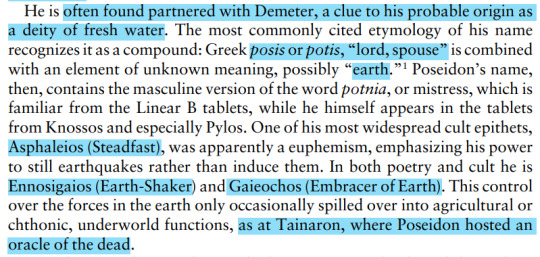
I'm two paragraphs into Poseidon's chapter in Ancient Greek Cults by Jennifer Larson and I'm already wanting to bite something
216 notes
·
View notes
Text
sorry i know i've complained about this a lot but if there was One thing i wish people on here would grasp wrt roman approaches to mythology. is the centuries and centuries of italian mythic tradition & transmission that existed here. like a lot of these myths were being told & transformed & developed local version before rome even existed. these guys were trading materials & traditions with the greeks since like the bronze age. a person in rome might of have heard a lot of these stories as a kid from their grandmother who heart it from her grandmother, who heard it from hers etc etc. they were living changing myths in italy! with their own variations even! so a roman author, while they DO extensively use greek literature, is nevertheless working off something that is a deeply embedded part of their culture too. to act like these ideas were just transplanted directly from 5th century athens to 1st century rome, and especially as if greece had the oral tradition while rome was purely literary, is silly
2K notes
·
View notes
Text
one more time, say it with me kids, MYTH IS NOT A SOURCE. myth is a subject! texts are a source that tell or discuss myths!! if you're making claims about an epithet being used for a god or a particular characterisation of a mythological figure, provide a text!! it matters greatly whether you're sourcing a greek orally transmitted epic or a roman lyric poem or a hellenistic scholar's mythological compendium!
3K notes
·
View notes
